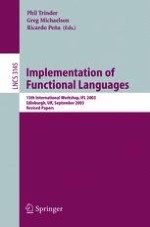2005 | Buch
Implementation of Functional Languages
15th International Workshop, IFL 2003, Edinburgh, UK, September 8-11, 2003. Revised Papers
herausgegeben von: Phil Trinder, Greg J. Michaelson, Ricardo Peña
Verlag: Springer Berlin Heidelberg
Buchreihe : Lecture Notes in Computer Science
